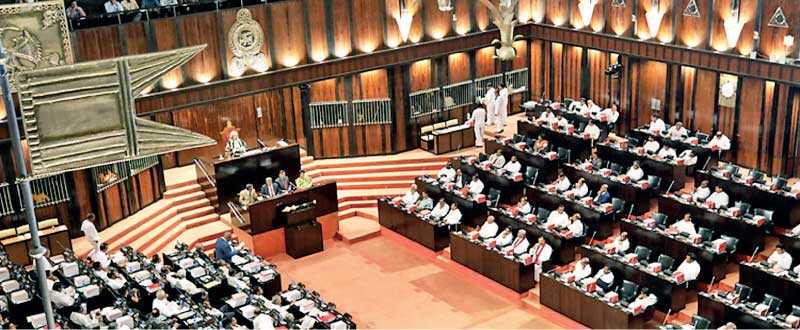Sunday Feb 15, 2026
Sunday Feb 15, 2026
Friday, 29 January 2021 00:52 - - {{hitsCtrl.values.hits}}

 By now it is clear that Sri Lanka as a country has fallen into the ‘worst of times’ as never before.
By now it is clear that Sri Lanka as a country has fallen into the ‘worst of times’ as never before.
It has been possible to keep the COVID mortality rate comparatively at a lower level, which, of course, was mainly due to the BCG vaccine administered to almost every citizen; yet currently, the pandemic is spreading freely, without control. The manner in which the COVID pandemic is being handled can be considered as an important index reflecting the extent of failure of Sri Lanka as a State.
The pandemic situation
The main responsibility and the leadership of steering the program to arrest the spread of the pandemic has been assigned to the security forces, not the health authorities. The partial neglect of the civil officialdom in this exercise has gradually led them to confine their service only to what is assigned them by law.
Strangely, there was a tendency towards depending more on mythical beliefs and practices rather than scientific approaches in combating the pandemic. The forced cremation policy being implemented in regard to the COVID deaths of Muslims has acted not only as a new form of oppression of Muslim people who had already been subjected to oppressive measures, but also has created a new phenomenon adding a stigma to the image of Sri Lanka, internationally.
The decline of the state
The COVID pandemic has caused to disrupt the world economy in general and the economies of many countries in particular. Yet, Sri Lanka has gone beyond that limit and become a country fast moving towards bankruptcy. The main sources of foreign revenue have collapsed and the main sources of revenue for the Government too, have collapsed, leaving the State in a precarious position where it finds unable to maintain its activities in balance. In this backdrop, the only option seems to be available for the Government in managing its affairs, though with difficulty, would be to sell the precious and scarce resources of the country to foreign powers. Even the opposition does not seem to have a different solution.
The catastrophic collapse of the Sri Lankan State is clearly visible. The three main power centres of the State that is the Legislature, the Executive and the Judiciary, have been in a state of dilapidation for a very long time and now in a state of collapse. The entire institutional system of the State is also in an equal state of degeneration and collapse.
The social order of the country is also in a state of disintegration. The ethnic, caste and religious divisions and violent conflicts and bloodsheds seem to have contributed to this state of affairs. This crisis, which has led to the bankruptcy of the country and the complete breakdown of the functioning of the State, can be seen as an inevitable outcome of the failure to implement two major reforms and several other reforms related to them.
The failure to build the modern nation has wreaked havoc causing violent conflicts and enormous bloodshed. Even after that the problem could not be solved. In addition, plundering of public property had become a regular feature of the state administration since 1977. This situation has led to a massive reduction in Government revenue and rotting the entire system of state institutions with rampant corruption.
Groping in the dark
Now the State and the social system in Sri Lanka remain not in a situation where they can be rescued by simple reforms except major structural reforms aimed at recreating both the State and the social system. But neither the Government nor the opposition seem to have any knowledge or understanding of this dire need.
The object of the Government appears to be to conduct the affairs of the country somehow or other, by replacing the civilian officialdom with military personnel, selling the country’s resources to China and depending more and more on the support of the latter. The opposition political parties also seem to be thinking that, in view of the miserable situation the Government is facing, they will be able to defeat the Government and emerge victorious at the next Presidential and Parliamentary elections. In that sense, not only the Government, but also the opposition is in a deep illusion.
Apart from the greed for power, neither party seems to have any understanding of the tragedy that has befallen the country nor any regret over the situation, and also the reforms that should be adopted to rescue the country from this unfortunate predicament. At least, they don’t seem to be interested in making a comprehensive study on the gravity of the issue.
In the field of human rights, warning signs are obvious that Sri Lanka will plunge into greater challenges internationally, than ever before. The UN High Commissioner for Human Rights, in her latest report states that the alleged human rights abuses against Sri Lanka can be substantiated and a travel ban should be imposed on those responsible for them, in addition to banning their assets.
From the moment President Gotabaya Rajapaksa assumed power, certain activities in the country have taken place in a manner that does not occur in any civilised country. Suspension of investigations and prosecutions of horrific crimes committed not only in the Tamil North but also in the Sinhala South especially during the previous Rajapaksa regime, releasing the accused people in connection with those crimes, the unlawful and ruthless policy adopted to persecute the officers involved in the investigations and the victims of those crimes have, undoubtedly caused to shock the people of the country who think reasonably and the international community as well.
Was the assassination of Lasantha a lie? Was the disappearance of Eknaligoda a lie? Was it a lie that 11 youth had been kidnapped for ransom and later killed? Shouldn’t the State look into these heinous crimes and those responsible for them? How could it be wrong for international bodies to act against a country in accordance with agreements which the country has entered into with international institutions, when the State is not fulfilling its duty?
The way the Government thinks is childish. Even in sports, the national sports council must act in accordance with the agreements it has entered into with the affiliated international body. The international organisations are formed by the consensus reached by a number of local institutions. The international body reserves the right to impose sanctions on its national members in accordance with the terms of the agreement entered into with them in the event that a national member commits an offense.
It is by the similar way that the UN Human Rights Council also has been empowered to act with regard to its member countries when they commit offenses violating the agreement entered into. The functioning of a State comes under constant surveillance of the international community. When the affairs of a country do not fall within the accepted civilised norms, it is natural for such a country to become liable for international pressures. The forced cremation of dead bodies of Muslim COVID victims can be considered as a foolish act that has caused a great deal of confusion. Similarly, the demolition of the monument erected at the University of Jaffna for the victims of the internal war too, can be described as a great folly.
What is the way out?
Sri Lanka is in a state of devastation in almost all fronts. Not only the internal condition, but also the external situation is extremely weak. If the international community decides to punish Sri Lanka, it will affect not only the people committing offenses but also the country in general. It would not be advisable to allow the country to be plunged into such an unfortunate situation; in this backdrop, the best option we can choose to escape this eventuality would be to reach a consensus of all political parties, and direct the country towards adopting a structural reforms program through a People’s Constitution which will certainly help paving the way for recreating the State and the social system that is acceptable to all parties concerned including the international community as well.